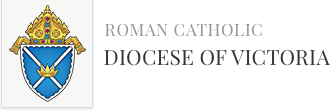The Chancery, located at the Pastoral Centre, serves as the administrative office of the Bishop and the Diocese. Our dedicated staff members support and serve Catholic parishes, schools, and communities by providing essential services, resources, and ministries.
Teresa Kellendonk was appointed the Chancellor of the Roman Catholic Diocese of Victoria in June 2025 by Bishop Gary Gordon.
The Chancellor acts in the name of the Bishop and serves as the official ecclesial notary, and head archivist of the Diocese. The Chancellor serves under the authority of the Bishop and coordinates the exercise of administrative responsibilities entrusted to other members of the Chancery serving at the Pastoral Centre.
Other responsibilities include the management and administrative function of gathering, arranging, and safeguarding curial records, and providing administrational service concerning vital statistics, clergy, sacraments, and parish pastoral reports.
The Chancellor coordinates services to priests and deacons in the Diocese, to support and enhance their life and ministry in the Church to the people of God. Together with the Bishop and Priest Personnel Committee, administers the placement of priests, and facilitates orientation for priests who are new to the Diocese. The Chancellor is also delegated to grant permission for visiting speakers and faculties for clergy from outside the Diocese.
The Diocesan Archives is the official repository for the records and artifacts which have historical, cultural, and/or leadership/long term significance to the Diocese in the pursuit of its mission of evangelization. The Archives function under the authority and direction of the Chancellor in compliance with approved policy.
The Archives of the Roman Catholic Diocese of Victoria collects, preserves, conserves, and makes available, as appropriate, those records or materials which reflect the history and tradition of the Church in the Diocese from its beginning in 1846.
Through the Communications Coordinator, the Chancery is responsible for sharing the important work of the Diocese with the Catholic community, media, and other partners by living our faith through effective communication.
Manages all aspects of the Diocesan website, social media, and media communications.
The Diocese of Victoria established a program for the Formation of Permanent Deacons in 2013, and the Bishop ordained the first candidates of the program in the summer of 2018.
The Deacon is an ordained minister in the Catholic Church who shares in the apostolic work of the Bishop, carrying the profound responsibility to pour out one’s life in service to others just as Christ came “not to be served, but to serve.” Through their ordination, Deacons share to a lesser extent, in the threefold apostolic ministry of the Bishop: a Ministry of Word, of Sacrament, and of Charity.
Deacons are official teachers and preachers of the Gospel. They preside at the celebration of baptism, funerals, matrimony, and they visit the infirm, the imprisoned, and the needy. They do not celebrate Mass, hear confessions, or anoint the sick. The word deacon comes from the Greek word diakonos which means “servant” or “helper.” In the early church, Deacons traditionally assisted the local Bishop. One of the early Church Fathers, St. Ignatius of Antioch, emphasized their role of service to the Church of God with the first Deacons also serving the poor and the needy of the community.
This Spirit of Service was also emphasized at the Second Vatican Council, describing the Roman Catholic Church as Servant to all Humanity in its every condition, weakness, and need. In response to this exhortation to serve the world, the Church restored the order of Deacons as a concrete sacramental sign to remind and challenge all the baptized to imitate Christ in the care for others. St. John Paul II reinforced this when he said: “the service of the deacon is the Church’s service sacramentalized.”
The Diocese of Victoria currently has five active Permanent Deacons serving in its parishes.
Our Event Protocol documentation provides the means to evaluate and approve, where appropriate, visiting lecturers to the Diocese.
The Diocese of Victoria, through its Hospital Chaplain, provides pastoral, spiritual and sacramental care to the Victoria General and Royal Jubilee Hospitals, as well as to those in the acute care hospitals located in Victoria.
The Hospital Chaplain is available by calling his pager at (250) 889-3761.
The Marriage Tribunal is one part of the Church's effort to express the mercy of Christ by offering hope and healing for those who suffer the consequences of broken marriages.
Our Chaplaincy at the William Head Federal Penitentiary.
John and Dana Mellis are our chaplains, who visit weekly.
The Roman Catholic Diocese of Victoria has implemented a series of policies and procedures to foster responsible ministry in a safe environment for all those who interact with the Catholic Church. We are committed to upholding and promoting the values expressed in the Gospel of Jesus Christ and caring for all who make up the body of Christ among us, including children, youth, adults, seniors, and the vulnerable.
Contact (Vocations)
I am showing a demo to Stephan
Tell The Reader More
The headline and subheader tells us what you're offering, and the form header closes the deal. Over here you can explain why your offer is so great it's worth filling out a form for.
Remember:
- Bullets are great
- For spelling out benefits and
- Turning visitors into leads.
Accoradtion Demo. One of the best ways you can learn about the Catholic Faith is to contact a Catholic parish near you to let them know that you are interested in learning more about the Faith. You can also explore an Overview of Catholic Teaching on our website, or consult the Catechism of the Catholic Church.
One of the best ways you can learn about the Catholic Faith is to contact a Catholic parish near you to let them know that you are interested in learning more about the Faith. You can also explore an Overview of Catholic Teaching on our website, or consult the Catechism of the Catholic Church.


